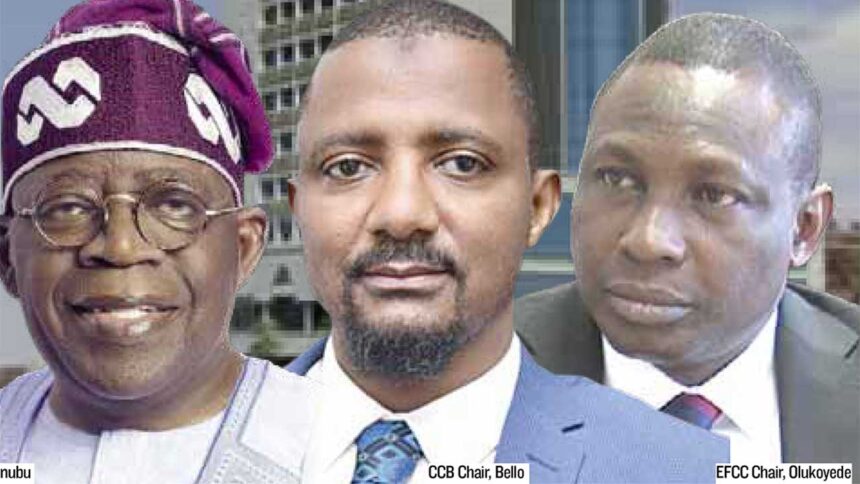In Nigeria, the Code of Conduct Bureau (CCB) mandates that all public officials, including political appointees and civil servants, disclose their assets and liabilities upon assuming and leaving office. However, compliance with this legal requirement has been low. In this report, GBENGA SALAU interrogates factors leading to non-compliance and its implications for good governance.
Established to maintain ethical standards and combat corruption in public office, the Code of Conduct Bureau’s (CCB) primary function is to enforce the code of conduct for public officers, as outlined in the Nigerian constitution.
This includes receiving asset declarations from public officers, investigating potential violations, and referring cases to the Code of Conduct Tribunal for adjudication.
The constitution requires that all public officials as well as civil servants declare their assets and liabilities, including those of their spouses and unmarried children under the age of 18 to the CCBs.
Despite this legal obligation, compliance rates remain alarmingly low. However, rather than enforce compliance, the CCB has continued to lament that the rules are not being complied with. In a rather ironic manner, it is appealing to those it should have prosecuted to help promote compliance.
From Lagos to Kastina, Borno to Imo, Cross River and Nasarawa states, political appointees and civil servants have refused to comply with the asset declaration system.
Yet the integrity of public office holders is paramount to the effective functioning of a democratic society.
For instance, in 2023, the Enugu State CCB Director, Mrs. Lucy Ijetta, revealed that 58 political appointees obtained asset declaration forms but only 23 filled and returned their forms to the bureau.
Likewise, during a visit to Lagos State Governor, Babajide Sanwo-Olu, in 2024, the Federal Commissioner, South West of the CCB, Abdulsalam Taofiq Olawale, disclosed that Lagos State public officials are not filling and submitting the Assets Declaration Form to the CCB.
He, therefore, appealed to Sanwo-Olu to help get the affected officials and personnel to comply.
It is also not surprising when recently, Kano State Governor, Abba Kabir Yusuf, directed all political appointees in the state to collect, fill and submit their asset declaration forms because the CCB has appealed to him to get state officials to comply especially as about 60 to 70 per cent of state appointees have not complied.
A report by Fixing the Future, a civil society organisation, revealed that over 94 per cent of public officials in Nigeria do not fully disclose their assets and liabilities as required by law, including declaring assets of spouses and unmarried children under 21.
Till date, the former Senate President, Bukola Saraki, remains the highest ranking government official that has appeared before the Code of Conduct Tribunal.
 The bureau, on September 22, 2015, had arraigned Saraki before the Code of Conduct Tribunal, on a 13-count charge bordering on false declaration of assets and non-compliance with the Code of Conduct for Public Officers.
The bureau, on September 22, 2015, had arraigned Saraki before the Code of Conduct Tribunal, on a 13-count charge bordering on false declaration of assets and non-compliance with the Code of Conduct for Public Officers.
A bench warrant had earlier been issued against him by Justice Danladi Umar for failing to appear before the Tribunal on September 18, 2015 and September 21, 2015 respectively.
Saraki pleaded not guilty to all the charges read out to him. His lead counsel, Joseph Dauda (SAN), had earlier tried to stop the Senate President from taking his pleas from the dock, but was over-ruled by Justice Danladi Umar.
Both Prosecution Counsel and Defense Counsel argued the case in their favour. The case was then adjourned to October 21, 2015, after both parties agreed on the date. The Tribunal granted him bail on self-recognition.
The Supreme Court eventually cleared Saraki of all allegations of false asset declaration.
The history of this establishment can be traced to the military administration of General Murtala Mohammed who appointed the late Alhaji Isa Kaita as Chairman.
However, the bureau was not functional until 1988, when General Ibrahim Badamasi Babangida’s administration appointed a 10-member board headed by the late Canon H. Mohammed.
It went further to promulgate decree 1 of 1989 to give legal backing to the Code of Conduct Bureau and Code of Conduct Tribunal.
In 1999, the General Abubakar Abdusalami’s administration enshrined the Code of Conduct Bureau in Section 153, Third Schedule, Part 1 and fifth Schedule, Part 1 of the Constitution of the Federal Republic of Nigeria.
The Code of Conduct Bureau and Tribunal Act, Chapter 58 LFN 1990 gave the bureau the mandate to establish and maintain a high standard of public morality in the conduct of government business and to ensure that the actions and behaviour of public officers conform to the highest standards of public morality and accountability.
Commenting on the widespread non-compliance with the assets declaration requirements, Programme Officer, Africa Network for Environment and Economic Justice (ANEEJ), Matthew Megwai, argued that one of the major reasons for widespread non-compliance with asset declaration requirements among public officials in Nigeria is lack of awareness, particularly, among civil servants at the Federal, state, and local government levels.
He stated that many public servants are simply unaware of the constitutional obligation to declare their assets, as stipulated under the Fifth Schedule of the 1999 Constitution of the Federal Republic of Nigeria, while some officials deliberately refuse to comply because they intend to engage in corrupt practices once in office.
Megwai stated that for the last category of individuals, the non-compliance is a strategic act to avoid scrutiny, making asset declaration a critical preventive tool in the fight against corruption.
Speaking, the Senior Programmer Manager, Community Life Project, Francis Onahor, observed that weak enforcement and sanctions has greatly contributed to the non-compliance.
He maintained that there is little fear of consequences owing to weak enforcement by the Code of Conduct Bureau (CCB) and slow judicial processes, adding that the absence of consistent and meaningful penalties for non-compliance encourages disregard for the law.
He, however, observed that there are bureaucratic challenges largely because the process is still largely manual and opaque, discouraging timely compliance.
He is nonetheless optimistic that the Online Asset Declaration System (OADS), if consciously implemented, will help in overcoming this challenge.
He also observed that many public officials view the process as a formality with little real impact, given that high-profile non-compliers often go unpunished.
“Since the declarations are not publicly accessible by default, there is little public pressure or scrutiny to encourage compliance. The lack of transparency and access to declaration forms weakens public oversight,” he stated.
Onahor further stated that successive administrations have shown limited commitment to fighting corruption in a consistent and impartial manner, which is why enforcement is often selective, influenced by political interests rather than a genuine commitment to anti-corruption.
Megwai noted that the current enforcement mechanisms for ensuring compliance with asset declaration laws are largely ineffective; stating that despite clear legal provisions, there is a noticeable gap in enforcement.
“Public officials routinely ignore the requirement to declare their assets, and there are rarely any consequences for non-compliance. This lack of accountability has contributed to a culture of impunity in the public sector. Strengthening enforcement requires political will, better inter-agency collaboration, and adequate resourcing of the Code of Conduct Bureau to investigate, prosecute, and follow through on violations without fear or favour.”
Megwai stated that making asset declarations publicly accessible would significantly improve transparency and accountability among public officials.
He added that when public servants know that their declarations are subject to public scrutiny, they are more likely to provide accurate and honest information.
“The fear of exposure serves as a strong deterrent against both under-declaration and inflation of assets. Also, allowing citizens to access these declarations empowers them to play active role in governance. Civil society organisations, investigative journalists, and concerned individuals would be better equipped to question discrepancies or red flags in the information provided. This public oversight can lead to early detection of corruption and enhance trust in government institutions.”
He also noted that the law, which provides that the CCB retains custody of asset declaration forms and makes them available for inspection under terms prescribed by the National Assembly, significantly, hinders effective public scrutiny and undermines transparency.
“By placing the power to prescribe access terms solely in the hands of the National Assembly, the law limits the ability of citizens and civil society to access crucial documents that can aid in detecting corruption. It strips citizens of a vital tool needed to hold public officials accountable.
“If concerns exist around the protection of personal data, those can be addressed through redaction of sensitive personal information such as residential addresses or bank account numbers. However, the substantive content of the asset declaration, particularly the nature and value of declared assets should remain publicly accessible.”
He said this is why some civil society organisations are currently advocating for a legislative amendment through a proposed bill that seeks to strike a balance between transparency and privacy.
On his part, Onahor stated that the clause that the CCB retains custody and grants access only under terms set by the National Assembly creates a bottleneck that undermines transparency.
“While it aims to control access and prevent misuse, it can also hinder independent verification. Citizens with legitimate concerns or valuable information are often unable to access the documents.”
Onahor also stated that limiting access gives officials room to shield misconduct and reduces the ability of the public to hold officials accountable.
He insisted that a more open system would empower whistleblowers and investigative journalists to uncover hidden assets and discrepancies, arguing that expanded public access that is appropriately managed could strengthen the system by leveraging citizen knowledge and scrutiny rather than promoting verification.
Similarly, a public analyst, Clifford Egbomeade, stated that as a Nigerian taxpayer and citizen, the fact that many public officers, politicians, and civil servants do not declare their assets— or do so without any form of public transparency could be discouraging.
“It feels like the system is designed to protect those in power rather than hold them accountable. This lack of openness undermines public trust and weakens the foundation of our democracy.
“Asset declaration is meant to prevent abuse of office and illicit wealth accumulation. But when the process is opaque and inaccessible, it becomes a mere formality rather than a tool for accountability. Without public scrutiny or legal consequences for non-compliance, many officials feel emboldened to bypass the system altogether. And they often do so with little fear of being caught or penalised.”
Egbomeade further said the rippling effect on governance and the economy are significant, noting that when public officials are not held to account, it creates a culture where corruption thrives. Nigeria reportedly loses billions of dollars each year to corrupt practices, and the absence of transparency in asset declaration plays a direct role in that loss.
“It also discourages honest civil servants and business owners who see that loyalty to the rules is not rewarded. Instead, impunity becomes the standard. This lack of transparency contributes to a broader climate of non-compliance. Officials know they can get away with not declaring assets because there’s no consequence and no public pressure. And the public, in turn, becomes cynical and disengaged. It’s a vicious cycle that feeds into low tax morale, poor governance, and a broken social contract.
“In a country where public resources are stretched thin, where health, education, and infrastructure need urgent attention, every naira lost to corruption matters. Transparency in asset declaration is a low-hanging fruit that can help restore trust, promote fiscal discipline, and support Nigeria’s broader development goals,” Egbomeade said.
Also commenting, Balogun Gboyega said many politicians and appointees who could not afford to maintain a motorcycle before being elected or appointed now drive fleets of cars within four years of being in government.
“I doubt if CCB critically verify some of the asset declaration forms submitted by the few who comply. Aside this, it also does not bother about those who did not submit. It is a pity that CCB is failing in its huge responsibility. Yet budgetary allocation goes to the agency yearly for this responsibility besides the salaries. Why not scrap it instead of the yearly waste that could help fix health or education challenges,” Gboyega stated.
While many may criticise the CCB for not living up to expectations in terms of delivering on its responsibility, The Guardian gathered that the agency is held back by poor funding, which limits it from carrying out its functions, and thereby, achieving the objectives for which it was set up.
An analysis of the CCB budget for 2020 to 2024 revealed that it got N15.24bn in five years as budgetary allocations.
While it was allocated N2.47bn in 2020, it got N3.14bn in 2021, N3.79bn in 2022, N2.69bn in 2023 and N3.14bn in 2024.
It is gathered that with under-funding, CCB may be pressured to ignore violations just as its poor record-keeping and administrative inefficiencies hinder proper monitoring.
Commenting on the poor funding for CCB in the face of the critical anti-corruption role it is meant to play, Mallam Auwal Ibrahim Musa, aka Rafsanjani, noted that the consistent underfunding of the CCB is both a strategic failure and a systemic contradiction.
He added that it undermines Nigeria’s constitutional and international commitments to transparency and accountability.
“The CCB is constitutionally empowered under the Fifth Schedule of the 1999 Constitution (as amended) to enforce ethical standards in public office, yet it is functionally incapacitated by inadequate financial resources. This sends a dangerous signal that anti-corruption enforcement is not a priority. No anti-corruption agency can perform its statutory duties without robust and predictable funding, particularly one with such a preventive mandate as the CCB.”
On why the CCB is poorly funded, Musa stated that the reasons are both political and structural. He said CCB’s independence is weakened by the budgetary control of the executive, which makes the institution vulnerable to political interference.
He continued: “There is often a deliberate attempt to incapacitate preventive institutions like the CCB that have the power to expose illicit enrichment and unethical conduct before it matures into full-scale corruption.
“There is a lack of sustained legislative oversight to hold the executive accountable for implementing appropriated funds for anti-corruption institutions. Until the three arms of government — Executive, Legislature, and Judiciary — fully respect their constitutionally defined roles in checks and balances, critical institutions like the CCB will continue to suffer neglect.”
Musa noted that the emphasis on political appointees alone creates a dangerous blind spot in Nigeria’s anti-corruption architecture. He believes civil servants should be actively captured for asset declaration.
He said: “Section 11(1) of the Code of Conduct Bureau and Tribunal Act mandates all public officers—including career civil servants—to declare their assets. Civil servants form the permanent bureaucracy that administers public funds and executes policy. If they are not held to account, then the fight against corruption is merely cosmetic.
“Asset declaration for civil servants ensures accountability in public expenditure, prevents abuse of administrative discretion, and deters the institutionalisation of petty and grand corruption in the public service. It also restores public confidence in governance and affirms that no one is above the law.”
Responding to the issue of gaps in the law guiding operation of the CCB that is hampering its performance, Musa stated that the enabling law of the CCB—the Code of Conduct Bureau and Tribunal Act—suffers from several limitations.
“It lacks enforceable timelines for asset verification, which allows delays and selective application. The Act does not also empower the CCB with prosecutorial autonomy; it must rely on the Code of Conduct Tribunal (CCT) or the Attorney-General for enforcement, often leading to political bottlenecks.
“The absence of digital infrastructure and statutory provisions for public access to declared assets stifles transparency and citizen oversight.”
On way forward, Musa suggested amendment to the act, to grant CCB operational and financial autonomy, prosecutorial powers, and clear timelines for verification and publication of asset declarations.
He added enforcement of digitization and open access policies that allow the public, media, and civil society to track compliance.
He further called for strengthening of collaboration with international partners, including those under UNCAC, ECOWAS Protocol on Good Governance, and the African Union to ensure Nigeria meets its treaty obligations on transparency and asset disclosure.
“Ultimately, the CCB must be insulated from political manipulation, adequately funded, and repositioned to serve its constitutional purpose without fear or favour. The media, civil society, and citizens must sustain pressure and vigilance to hold duty bearers accountable. No democracy can thrive where the rule of law is selectively applied.”
Although civil servants are also meant to declare their assets, the attention is usually on political appointees.
The Guardian also learnt political interference contribute to this, as influential politicians and top government officials often manipulate anti-corruption agencies, weaken compliance efforts, as well as complex bureaucratic process that makes the declaration process sometimes cumbersome.
Though The Guardian did not get official statement on low compliance from CCB, however, a staff of the agency, who pleaded anonymity because he is not authorised to speak, attributed this to several interrelated factors, including systemic weaknesses, cultural norms and enforcement failures.
He listed some of the key reasons to include lack of proper verification or no verification by oversight body – CCB – as well as little or no consequences for non-declaration.
He also mentioned corruption and impunity, as high networth individuals believe they can evade the process, as declarations are often kept confidential, preventing public scrutiny and civil society oversight unlike some countries where declarations are publicly accessible, “Nigeria’s system lacks openness,” he said.
The source also listed a lack of political will, executive interference, weak legal framework, delayed prosecution, poor verification and tracking of declared assets, inadequate funding and operational constraints, secrecy in asset declarations, low public awareness and civil society engagement and corruption within the CCB itself.
He suggested strengthening political will and independence of CCB, legal and judicial reforms, digital asset declaration system, public disclosure of asset declaration, increase funding and capacity building; whistle-blower protection and incentives; public awareness campaign and anti-corruption measures within the CCB.










